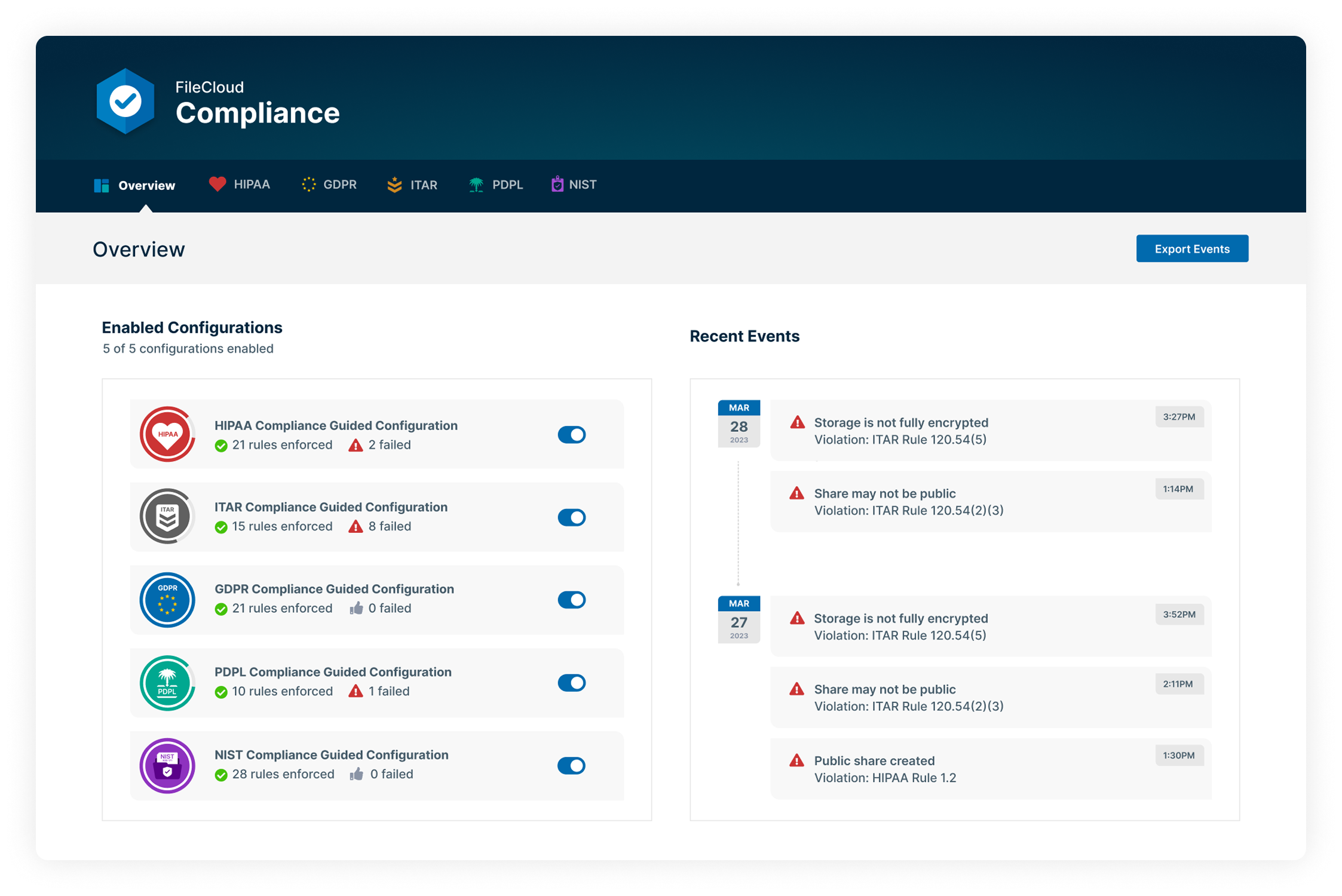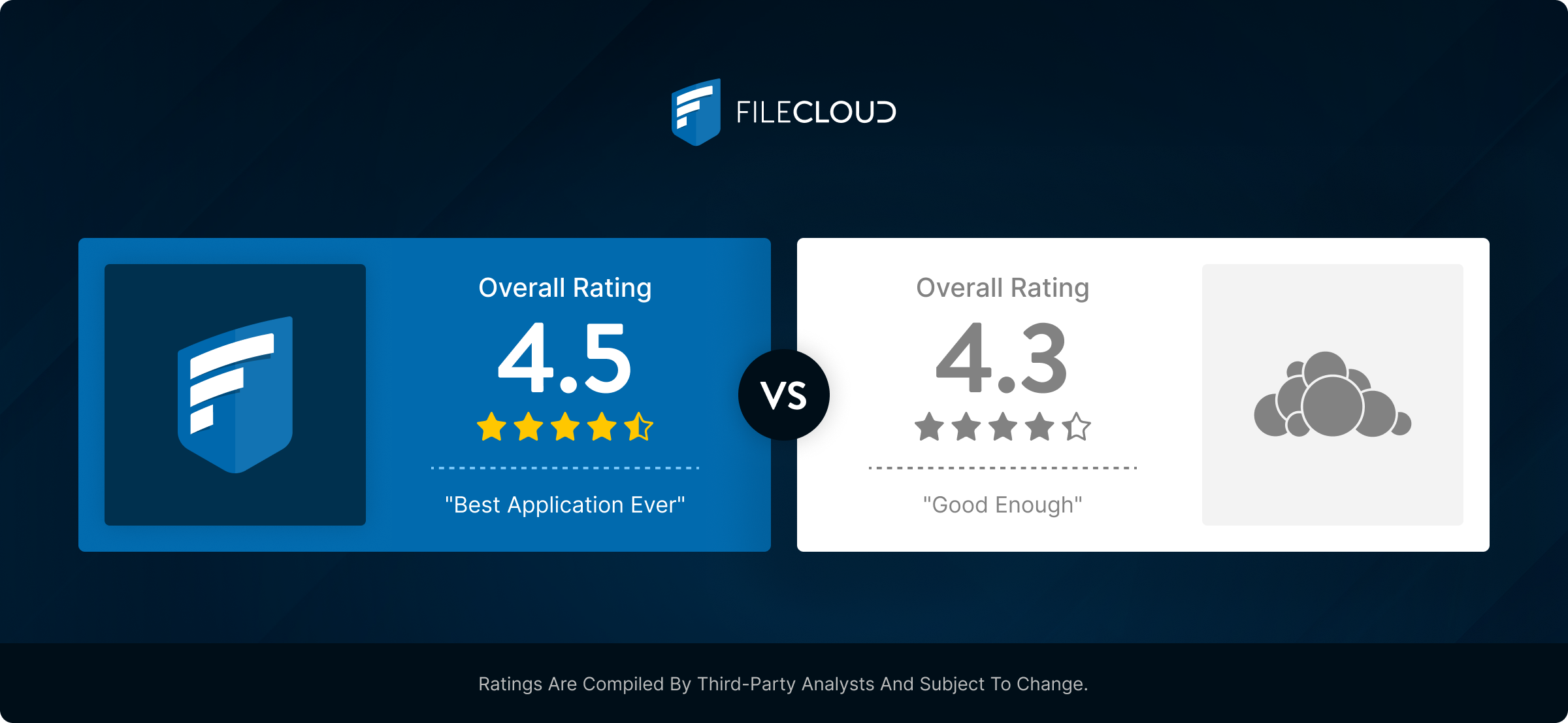
ownCloud alternative for Enterprise File Sharing
Choosing the right enterprise file sharing and synchronization (EFSS) platform can make or break an organization's productivity and security posture. While both FileCloud and ownCloud offer file sharing capabilities, significant differences in their approach to enterprise security, compliance, and collaboration make one clearly superior for business-critical deployments.
Following ownCloud's acquisition by Kiteworks, many IT leaders are reassessing their file sharing strategies. This comprehensive comparison examines FileCloud as a compelling ownCloud alternative for organizations that refuse to compromise on security and compliance requirements.
Deployment in FileCloud vs ownCloud
FileCloud's deployment flexibility addresses one of the most significant pain points organizations face with traditional file sharing solutions. Since the Kiteworks acquisition, ownCloud no longer publishes pricing information for its deployment options. In comparison, FileCloud offers transparent pricing across on-premises, cloud, and hybrid deployment models without hidden costs.
The FileCloud platform's API-first architecture enables rapid deployment across existing IT infrastructure, eliminating the bottlenecks that plague legacy systems. ownCloud is capable of running more complex deployments to suit data residency, automation, or regulatory compliance requirements; however, enterprise admins are confronted with a DIY configuration process, requiring extensive technical expertise for proper deployment. FileCloud's streamlined deployment process gets organizations up and running quickly without sacrificing security or functionality.
FileCloud vs ownCloud Admin Capabilities
Administrative overhead represents a critical consideration for IT teams managing distributed workforces. FileCloud's centralized admin interface, stress tested to scale for enterprise environments, provides comprehensive visibility and control over file access, sharing permissions, and user activity across all deployment models.
By comparison, admins of ownCloud environments note performance struggles for large-scale enterprise deployments. As functionalities begin to break, it can be difficult for admins to troubleshoot and resolve issues on their own, while delays in official support contribute to frustration and bottlenecks.
FileCloud's intuitive admin console consolidates user management, security policies, and compliance monitoring into a single interface, dramatically reducing the complexity that makes ownCloud difficult to manage at scale. When help is needed, the FileCloud support team is ready to step in and collaborate toward an effective solution.

Security Settings in FileCloud vs ownCloud
Security is a key differentiating factor between FileCloud and ownCloud. FileCloud delivers AES encryption for data at rest and TLS 1.3 for data in transit, with FIPS-validated encryption protocols that meet the strictest security requirements. Built-in security features include SAML SSO, ransomware protection, and comprehensive audit trails that exceed basic file sharing requirements.
ownCloud's security limitations become apparent in enterprise environments where regulatory compliance isn't optional. The platform lacks FIPS-validated encryption and restricts advanced security features like SAML SSO and ransomware protection to expensive enterprise plans, creating security gaps that expose organizations to unnecessary risk.
FileCloud vs ownCloud Compliance and Governance Tools
Regulatory compliance represents perhaps the most significant advantage FileCloud holds over ownCloud. Role based access controls, user authentication, granular file and folder permissions, user/group policies, and Zero Trust File Sharing® are features that come with FileCloud out of the box. Admins can create a highly customized and controlled environment to ensure that only authorized users have access to data (and only the data they need).
Furthermore, enterprises leveraging the Advanced tier of FileCloud gain access to the Compliance Center. This easy-to-use dashboard offers configurations for NIST 800-171, HIPAA, ITAR, GDPR, and KSA PDPL, connecting complex regulatory frameworks with practical access controls and security tools available within the FileCloud platform.

For organizations operating under NIST requirements, FileCloud can also be run in FIPS mode. This mode enforces FIPS 140-2 validated cryptographic modules for data at rest and in transit. ownCloud does offer encryption, but their cryptographic standards are not FIPS validated, and thus may not be enough for an enterprise that must demonstrate FIPS or NIST compliance.
The integrated compliance dashboards eliminate the guesswork around regulatory adherence, providing IT leaders with clear visibility into their compliance posture across multiple frameworks simultaneously.
Content Management in FileCloud vs ownCloud
Content classification and management capabilities highlight another area where FileCloud excels beyond ownCloud's basic offerings. With metadata management, organizations can leverage built-in metadata sets or create their own to optimize data visibility and operational efficiency.
With metadata sets defined, admins can then interact with FileCloud's content classification system, manually tagging files with metadata, which can then be referenced by sharing limits, data leak prevention rules, retention policies, and access controls. Automated classification is also available, so that files are scanned and tagged upon upload. Admins can set up content classification rules with either the RegEx builder or the visual builder to enable automated governance processes from the moment data enters the environment.
While ownCloud struggles with scalable content management, the advanced data governance tools in FileCloud provide the centralized control necessary for enterprise-grade content management without sacrificing user experience or operational efficiency.

ownCloud vs FileCloud Collaboration & Sharing
Real-time collaboration represents a fundamental requirement for modern distributed teams. FileCloud's seamless integration with Microsoft 365, Google Workspace, and existing IT infrastructure enables immediate productivity gains without forcing users to abandon familiar tools.

Furthermore, FileCloud’s workflow automation capabilities eliminate manual processes that reduce productivity and increase error rates. The built-in e-signature dashboard via Signority integration supports streamlined approval workflows within the secure FileCloud environment.
In comparison, ownCloud's limited collaboration features require expensive enterprise upgrades (e.g., workflow automation) or be lacking entirely (e-Signature).
Remote (Mobile) Access in ownCloud vs FileCloud
Mobile access capabilities reveal another significant gap between these platforms. FileCloud provides mobile apps with full remote device management, including remote wipe and user blocking capabilities built into the core platform.
ownCloud's mobile access limitations become apparent when organizations need controlled remote access to their EFSS environment. Native remote device monitoring is unavailable in ownCloud, forcing organizations to rely on third-party solutions that introduce additional complexity and security risks.
FileCloud's mobile apps are available across all deployment tiers, while ownCloud restricts mobile access to the enterprise plans, creating unnecessary barriers to productivity for distributed teams.
Conclusion
The choice between FileCloud and ownCloud becomes clear when enterprise requirements are properly evaluated. FileCloud's superior security architecture, comprehensive compliance capabilities, and seamless collaboration features address the core limitations that make ownCloud challenging for enterprise deployments.
Following ownCloud's acquisition by Kiteworks, the platform's uncertain future development roadmap creates additional risk for organizations planning long-term file sharing strategies. FileCloud's independent development and transparent pricing model provide the stability and predictability that enterprise IT leaders require.

Ready to experience the FileCloud advantage?
Start a free trial today or request a demo to see why IT leaders choose FileCloud over ownCloud.

Product Marketing Manager